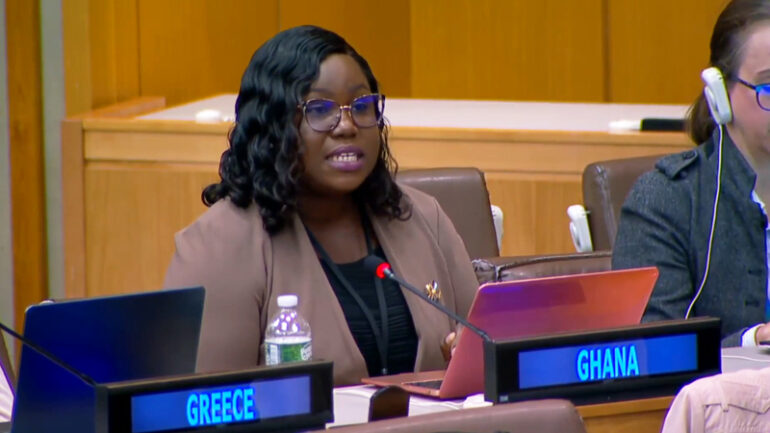Third Committee, 5th plenary meeting – General Assembly, 79th session

- Posted by admin
- Posted in News, Statement & Remarks, Third Committee
Edna Stephanie Williams
1st Secretary/ Social Cultural
and Humanitarian Affairs
October 07, 2024
DURING THE THIRD COMMITTEE MEETING OF THE 79TH SESSION OF THE UNITED NATIONS GENERAL ASSEMBLY
AGENDA ITEM 107: CRIME PREVENTION AND CRIMINAL JUSTICE
Mr. Chair,
Ghana aligns herself with the statement delivered by the African Group and wishes to make the following remarks in our national capacity. At the core of our efforts to promote the wellbeing of our populations and ensure the prevention of crime and the delivery of justice should be the implementation of measures that align with Sustainable Development Goal 16, which seeks to build peaceful, just, and inclusive societies.
In Ghana’s view, crime prevention should not only be about ensuring security but importantly it should reflect the total commitment required for human dignity, justice, and a future free from fear. In this regard, justice systems should remain inclusive, uphold the rule of law, and protect human rights for all. Resources and capacity however lie at the heart of the challenges many developing countries, including Ghana, face in their efforts to fully reflect these aspirations and in response to the significant cross-border vulnerabilities the global community faces, especially with the rise of cybercrime, human trafficking, and organised crime, Ghana believes that consideration of the four (4) points it shares on this matter would be helpful.
First, we urge Member States to strengthen international cooperation. Enhanced intelligence-sharing, cross-border legal coordination, and joint law enforcement are necessary to dismantle criminal networks. Where global arrangements can intersect regional initiatives and frameworks such as those of the African Union and its regional economic communities like ECOWAS, such opportunities should be explored and used to narrow the gaps and tighten the scope for operation by criminal networks.
Second, we emphasise the need to equip national institutions, such as the police, judiciary, and prosecutorial bodies, with adequate resources. The global community must support the efforts of countries in need with technical and financial assistance to enhance the capacity of their institutions and the effectiveness of their responses.
Third, crime does not exist in a vacuum. To address its root causes, countries must invest in economic empowerment, social inclusion, and the engagement of youth and marginalised groups. Tackling poverty and inequality is critical to preventing crime. Amid the prevailing global economic crunch which has severely affected developing countries, flexible and concessionary facilities from bilateral and multilateral sources would be needed to preserve the capacity of States to sustain pro-poor programmes despite existing fiscal constraints.
Fourth, we call for the strengthening of global institutions like the United Nations Office on Drugs and Crime (UNODC), the Commission on Crime Prevention and Criminal Justice (CCPCJ), and the United Nations African Institute for the Prevention of Crime and the Treatment of Offenders (UNAFRI). These institutions play a crucial role in global crime prevention and need sufficient resources to support Member States. We also urge Member States to swiftly ratify the International Convention on Countering the Use of ICT for Criminal purposes once it is adopted by the UN General Assembly, as this will enhance global cooperation in combating cybercrime.
Mr. Chair,
At the national level, Ghana has taken concrete steps to strengthen its criminal justice system. The Witness Protection Act (2018) ensures the safety of witnesses, while One Stop Centres have been established to support victims of violent crimes, including domestic violence and human trafficking. Ghana has also introduced plea bargaining to reduce court congestion and expedite justice, and the Justice for All Programme has also reduced remand prisoner populations, ensuring timely justice and rehabilitation for vulnerable individuals. Additionally, Ghana’s Cyber Security Act and the establishment of the Cyber Security Authority are addressing the growing threat of cybercrime.
Through regional partnerships like the ECOWAS Plan of Action to Combat Trafficking in Persons and the African Union’s Plan of Action on Crime Prevention, Ghana continues to enhance its capacity to combat transnational crime. However, like global institutions, our national bodies require adequate resources to function effectively.
In conclusion, Ghana remains fully committed to the principles of the Kyoto Declaration and urges all Member States to strengthen their institutions, provide them with adequate resources, and collaborate in solidarity to build a world where justice prevails, and crime finds no refuge.
Thank you.
